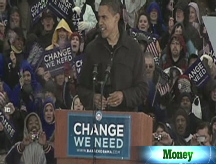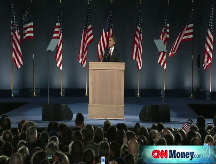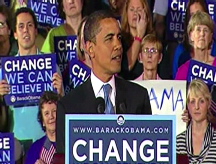Married by America: Wall Street and the White House
The financial crisis won Barack Obama the presidency. Now Obama's White House will have to save Wall Street.
WASHINGTON (Fortune) -- In the end, it was the travails of Wall Street - which he scolded 14 months ago for too often going for the "quick kill" - that enabled Barack Obama to seal the deal with America's voters last night and stand before 150,000 supporters in Chicago's Grant Park to declare that "this is our moment."
All summer long, Obama ran neck and neck with Republican opponent John McCain. But on Sept. 17, two days after the Dow Jones plummeted 300 on news that Lehman Brothers was declaring bankruptcy and insurance giant AIG was on the brink, the first-term senator from Illinois opened up a lead in the polls - one that widened as the financial crisis deepened.
Obama benefited from a political environment that was becoming treacherous for any Republican, even a maverick like McCain, since the markets were teetering on the GOP's watch.
But it was also Obama's reaction to the crisis that began to erase in enough voters' minds the doubts about his readiness to be president. During the primary season, Hillary Clinton played on those doubts: Remember the TV ad asking voters who they wanted to answer the Oval Office phone when crisis called at 3 a.m.? Early in the general election, McCain - a Vietnam POW and U.S. senator for 22 years - plied those same doubts about his youthful opponent's readiness as commander-in-chief.
As a financial crisis rocked the nation, though, voter worries about Obama's experience were replaced with concerns about McCain's temperament. Tellingly, a mid-October New York Times/CBS poll found that roughly 7 in 10 voters think Obama has the right kind of "temperament and personality" to be president, while just over half said that of the more experienced McCain.
McCain's choice of Alaska Gov. Sarah Palin, a charismatic figure who displayed a thin knowledge of national and international issues in early media interviews, contributed to that shift. As a cancer survivor who turned 72 in August, McCain's choice of vice president was important to voters - and independents in particular didn't believe Palin was ready to govern the nation.
The Republican nominee showed a similar pattern of unpredictability in reacting to the financial crisis - calling the Treasury Department's takeover of Fannie Mae and Freddie Mac "the latest sweetheart deal" before reluctantly supporting it; suspending his campaign to broker a rescue package and then reversing himself; supporting the Bush administration's $700 billion rescue and then angering conservatives with a sweeping proposal for the government to buy up mortgages from distressed homeowners.
The Obama campaign began calling McCain "erratic" and the label stuck, with voters employing it in press and pollster interviews.
In the year since his 2000 presidential campaign, McCain's image as the scrappy boxer had made him one of America's favorite politicians. (He used the word "fight" 25 times in his convention acceptance speech.) But with the stock market plummeting and major financial institutions on the brink of failing, with a public deeply pessimistic and frightened about their futures, that persona was out of sync with the times.
By contrast, Obama consistently issued cautious support for Treasury's moves and avoided the temptation to score political points or offer alternatives. His carefully crafted image as a cautious conciliator boosted his public standing, as more voters began to tell pollsters they trusted him to lead the country. This, too, was the image that the public witnessed in three presidential debates - Obama cool, collected, even presidential in the face of frightening economic times.
The heft of the advisory team that Obama has assembled over the past 11 months, as much as his own personality, enabled the Democrat to establish his credentials as a potential president as the markets went into a spine-chilling tailspin while McCain - relying more on his own instincts than outside expertise - shifted direction.
The counsel Obama sought came from the famed former Federal Reserve Chair Paul Volcker, billionaire Warren Buffett, from two former Treasury Secretaries - Lawrence Summers and Robert Rubin, from former White House economic advisers Laura Tyson and Gene Sperling, from CEO's such as JP Morgan's Jamie Dimon, Google's Eric Schmidt and PepsiCo's Indra Nooyi, from academics such as the University of Chicago's Austan Goolsbee and Harvard's Jeffrey Liebman. Coordinating all this advice was a youthful but brilliant young economist, Jason Furman. (See a gallery of Obama's economic advisors.)
Presidents can be judged by the company they choose to keep. Sarah Palin understood this when she accused Obama of "palling around with terrorists," a reference to Obama's association with William Ayers, 60s radical and former member of the violent Weather Underground. The Pennsylvania Republican party understood this when it aired a last-minute commercial in that critical swing state reminding voters that Obama's former pastor Jeremiah Wright and his declaration of "not God bless America but God damn America."
But if we're to judge the president-elect for his associations during this long and grueling presidential campaign, a different pattern for governance emerges. Obama's stable of advisers is deep and experienced, and suggests a more centrist sensibility than his Chicago associations, or even his campaign rhetoric. "I've been very impressed with the caliber of people around Obama," concedes McCain's top economic adviser Kevin Hassett, adding that "there's great hope they won't fall down a partisan path."
Despite the dramatic gains by Democrats in Congress last night, we can hope that Hassett is right. In his momentous address as America's first African-American president last night, Obama vowed to govern not "a collection of red states and blue states...but the United States of America." He promised to do so "with a measure of humility" and a determination to listen to his opponents.
Nearly two years ago, as Obama stood in front of Illinois' Old State Capitol to launch his presidential bid, the junior senator from Illinois gave a speech that mentioned business leaders exactly once - when he cited the steel mill closed by "distant executives," bringing widespread unemployment to the Chicago neighborhood he tried to organize after his short corporate stint. And throughout his nearly two-year presidential campaign, his stump speeches brimmed with references to the "greed" of Wall Street and overpaid CEO's.
Now, though, the inconvenient twists of history are about to force President-elect Obama into partnership with American business as he tries to rescue the country from a credit crisis and recession that could be the longest and deepest since the 1930s.
'How you well you do is inextricably linked with how well America does," Obama told the financial community in that Wall Street speech a year ago.
It's also inextricably linked to how well Barack Obama's historic White House does. ![]()
-
 The retail giant tops the Fortune 500 for the second year in a row. Who else made the list? More
The retail giant tops the Fortune 500 for the second year in a row. Who else made the list? More -
 This group of companies is all about social networking to connect with their customers. More
This group of companies is all about social networking to connect with their customers. More -
 The fight over the cholesterol medication is keeping a generic version from hitting the market. More
The fight over the cholesterol medication is keeping a generic version from hitting the market. More -
 Bin Laden may be dead, but the terrorist group he led doesn't need his money. More
Bin Laden may be dead, but the terrorist group he led doesn't need his money. More -
 U.S. real estate might be a mess, but in other parts of the world, home prices are jumping. More
U.S. real estate might be a mess, but in other parts of the world, home prices are jumping. More -
 Libya's output is a fraction of global production, but it's crucial to the nation's economy. More
Libya's output is a fraction of global production, but it's crucial to the nation's economy. More -
 Once rates start to rise, things could get ugly fast for our neighbors to the north. More
Once rates start to rise, things could get ugly fast for our neighbors to the north. More










